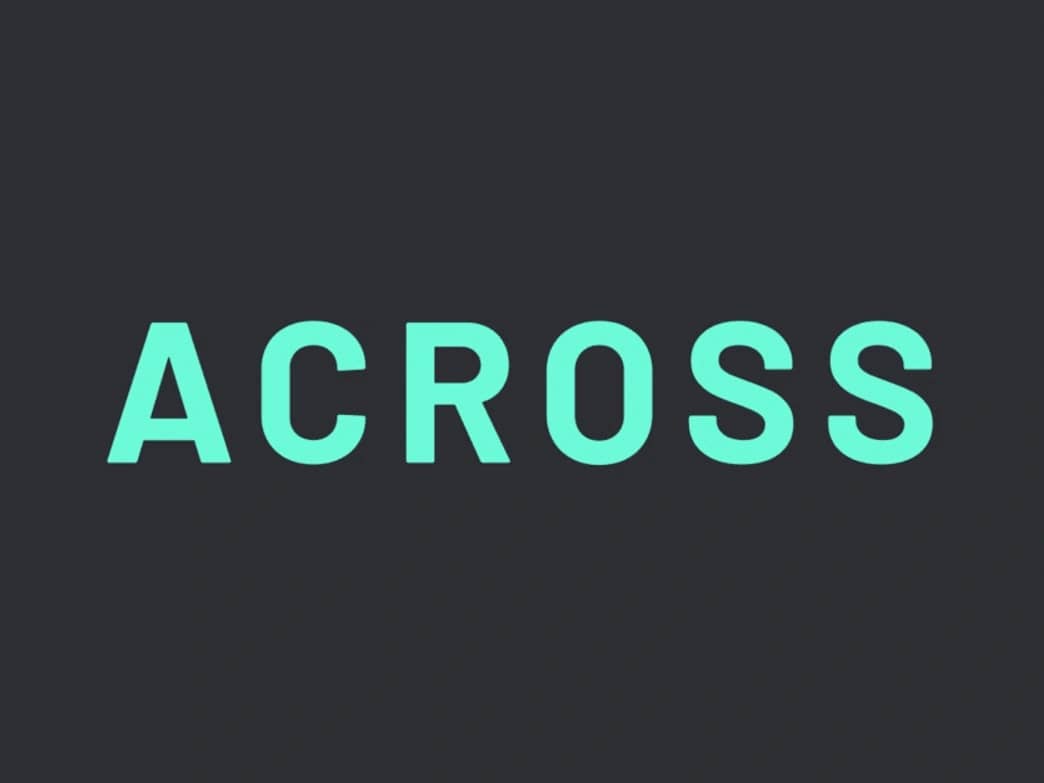위키 구독하기
Share wiki
Bookmark
Across
0%
Across
Across는 크로스체인 전송을 용이하게 하는 상호 운용성 프로토콜입니다. 보안을 유지하면서 속도와 낮은 비용에 중점을 둡니다. 크로스체인 인텐트를 위해 구현된 최초의 프로토콜입니다. [1][2]
개요
Across는 인텐트를 중심으로 설계된 상호 운용성 프로토콜로, 보안을 손상시키지 않으면서 빠르고 비용 효율적인 크로스체인 전송을 가능하게 합니다. 이 프로토콜은 자산을 전달하거나 트랜잭션을 실행하여 사용자 주문을 이행하기 위해 경쟁하는 릴레이어와 제3자를 소개합니다. 사용자는 원하는 결과를 지정하고 릴레이어는 이를 신속하게 이행하며, 정산 계층은 인텐트가 확인되면 릴레이어가 보상을 받도록 보장합니다. Across는 자산 브리징을 위한 dApp과 개발자가 크로스체인 기능을 애플리케이션에 통합할 수 있는 정산 계층을 제공합니다. [3][4]
Across로 전송을 시작하는 사용자는 체인 A의 스포크 풀에 자금을 예치하고 목적지와 수수료를 지정합니다. 그러면 릴레이어가 예치금을 확인하고 체인 B에서 사용자에게 해당 금액을 제공합니다. 릴레이어는 낙관적 오라클 (OO)에 트랜잭션 증명을 제출하고, 확인되면 이더리움 메인넷의 허브 풀에서 상환됩니다. 이 풀의 유동성 공급자는 사용자 예치금에서 수수료를 얻습니다. [3][4]
ERC-7683
Uniswap Labs와 Across는 크로스체인 작업을 지정하기 위한 통합 프레임워크를 만들어 크로스체인 인텐트에 대한 새로운 표준을 제안합니다. 이 표준은 유동성 액세스 및 활성 필러와 같은 크로스체인 인텐트 시스템의 문제를 해결하며, 이는 더 높은 비용, 더 긴 대기 시간 및 증가된 실패율로 이어질 수 있습니다. 크로스체인 인텐트 시스템은 향상된 경쟁과 효율성을 통해 사용자 경험을 표준화하고 개선함으로써 상호 운용하고 인프라를 공유할 수 있습니다. [5][6]
특징
크로스체인 인텐트
인텐트는 사용자가 특정 실행 경로가 아닌 결과를 지정하는 주문입니다. 인텐트는 단일 체인 또는 크로스체인이 될 수 있으며, Across는 크로스체인 인텐트에만 집중합니다. 크로스체인 인텐트를 위한 Across의 아키텍처는 사용자 인텐트를 처리하기 위한 견적 요청 메커니즘, 이러한 주문에 입찰하고 이행하는 릴레이어 네트워크, 이행을 확인하고 릴레이어에게 보상하는 정산 계층의 세 가지 계층으로 구성됩니다. 크로스체인 인텐트의 진화는 다음과 같습니다. [6]
- 1단계: Across가 2021년부터 지원해 온 체인 A에서 체인 B로 동일한 자산을 이동합니다.
- 2단계: 체인 A에서 체인 B로 자산을 이동하고 원본 예치금과 함께 지침을 포함하여 용이하게 하는 체인 B에서 트랜잭션을 실행합니다.
- 3단계: 체인 A에서 자산 X를 체인 B에서 최소 금액의 자산 Y로 교환하고 체인 B에서 트랜잭션을 실행하며, 현재 Across Settlement에서 지원됩니다.
카노니컬 자산 극대화
카노니컬 자산은 홈 블록체인에서 토큰의 원래 형태를 나타내며 안전한 크로스체인 가치 전송에 매우 중요합니다. 상호 운용성에서 토큰은 카노니컬 또는 대표적일 수 있으며, 보조 체인에서 자산을 보호하기 위한 신뢰 가정의 차이가 있습니다. 토큰은 기본 체인에서 토큰을 잠그거나 소각하고 대상 체인으로 메시지를 보내고 새 토큰을 민팅하여 체인 간에 이동됩니다. 이 프로세스의 보안은 사용된 확인 방법에 따라 달라집니다. 카노니컬 브리지는 확인을 위해 보안 계약에 의존하는 반면, 제3자 메시지 브리지는 다양한 신뢰 모델을 사용하고 보안 위험을 초래할 수 있습니다. [7]
Across의 인텐트 기반 브리지는 제3자 메시지 브리지의 보안 절충을 피하고 기존 카노니컬 브리지보다 빠르고 저렴한 솔루션을 제공합니다. 릴레이어 네트워크를 사용하여 카노니컬 자산으로 브리징 요청을 신속하게 이행하는 동시에 정산 계층은 확인 및 상환을 처리하여 카노니컬 자산과 대표 자산의 장점을 결합합니다. [7]
제품
Across 브리지
Across 브리지 dApp은 크로스체인 자산 전송을 위한 저비용, 고속 솔루션을 제공합니다. 최종 사용자에게 체인 간에 가장 빠르고 비용 효율적인 브리징을 제공합니다. 개발자를 위해 Across 브리지는 REST API를 통해 애플리케이션에 즉각적이고 저렴한 유동성을 통합합니다. 이를 통해 사용자는 앱 내에서 자산을 원활하게 온보딩하고 모든 체인에서 상호 작용하여 사용자 경험과 유지율을 향상시킬 수 있습니다. [3][8]
Across+
Across+는 예치, 대출, 스왑 및 민팅을 포함한 크로스체인 기능 모음을 제공합니다. 앱 작업에 브리지 트랜잭션을 통합하여 사용자 경험을 간소화하고 UI를 향상시킵니다. 이 솔루션은 앱 유동성을 유지하면서 지원되는 체인에서 유동성 액세스를 확장합니다. 유지 관리 노력을 늘리지 않고도 새로운 체인으로의 확장을 단순화합니다. 통합은 간단하며 스마트 계약 변경이 필요하지 않습니다. 사용자는 빠르고 비용 효율적으로 다른 체인에서 모든 앱과 상호 작용할 수 있습니다. [9]
Across 정산
Across 정산은 크로스체인 인텐트 주문 흐름을 위해 설계된 정산 계층입니다. 프로토콜과 최종 사용자를 위한 정산 비용을 최소화하기 위해 가스 최적화와 지연된 확인을 강조합니다. 모듈식이고 생산 준비가 완료된 솔루션으로서 효율적인 브리징 및 브리지 추상화를 위한 기반을 제공하여 Across 브리지 및 Across+ 제품을 지원합니다. [10]
Across 정산을 통해 다른 애플리케이션은 크로스체인 인텐트에 대한 기능을 활용하여 보안, 타이밍 및 비동기 문제를 해결하면서 확인 및 이행을 단순화할 수 있습니다. 주요 이점으로는 가스 비용을 보다 효율적으로 확장하는 집계되고 낙관적인 확인과 릴레이어 오버헤드와 복잡성을 줄여 더 나은 가격 책정 및 실행으로 이어지는 릴레이어 크로스체인 관리가 있습니다. [10]
ACX
Across 프로토콜 토큰인 $ACX는 프로토콜 및 해당 재정의 분산형 거버넌스에 사용되는 ERC-20 토큰입니다. 2022년 11월 출시 이후 $ACX는 포럼, 스냅샷 및 oSnap과 같은 플랫폼을 사용하여 아이디어 구상, 토론, 제안, 피드백, 투표 및 실행을 포함하는 구조화된 프로세스를 통해 의사 결정을 용이하게 했습니다. 오프체인 투표를 기반으로 한 온체인 트랜잭션입니다. [11]
토큰노믹스
ACX의 총 공급량은 10억 개이며 다음과 같이 할당됩니다. [12]
거버넌스
Across 거버넌스 프로세스는 DAO가 진화함에 따라 적응하도록 설계되었으며 지속적인 문서입니다. 누구나 참여할 수 있으며 ACX 토큰 보유자는 제안에 투표할 수 있습니다. 현재 토큰 보유자는 재정 지출 및 거버넌스 업데이트를 감독하며, 결정은 아이디어 구상에서 초안, 제안 및 구현에 이르는 경로를 따릅니다. [13]
파트너십
지원되는 체인
투자자
2022년 11월 24일, Across는 Hack VC, Placeholder 및 Blockchain Capital에 1,000만 달러의 개인 토큰 판매를 마감했으며, 이들은 총 5,000만 ACX를 구매했습니다. [14]
Klaster
2024년 7월 11일, Klaster는 온체인 사용자 경험을 향상시키기 위해 Across를 통합했습니다. 이 프로토콜은 단일하고 직관적인 인터페이스를 통해 체인을 추상화하여 원활한 크로스체인 상호 작용을 가능하게 했습니다. Across Bridge를 통해 Klaster 사용자는 상호 운용성 공간에서 가장 빠르고 비용 효율적인 브리지를 통해 쉽게 전송을 수행했습니다. [15]
Nekodex
2024년 8월 12일, Perpetual Protocol에서 제공하는 모바일 거래 플랫폼인 Nekodex는 크로스체인 인텐트 DEX를 출시하기 위해 Across를 통합했습니다. 이 새로운 제품은 또한 계정 추상화를 도입하여 사용자에게 최고 수준의 UX 및 UI를 특징으로 하는 분산형 거래 경험을 제공했습니다. [16]
잘못된 내용이 있나요?
